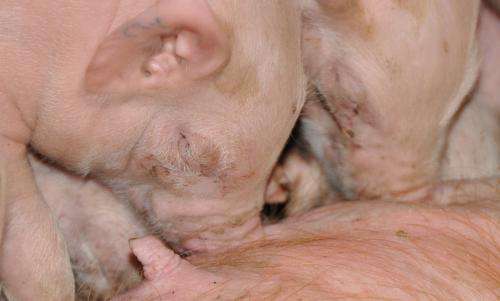Passing on the right antibodies: Protecting piglets from diarrhea

The parasite Cystoisospora suis affects suckling pigs causing severe intestinal problems, such as diarrhoea. Scientists at the University of Veterinary Medicine, Vienna (Vetmeduni) have now shown that antibodies against Cystoisospora suis are passed from mother to their piglets via the milk. Surprisingly however, the antibodies do not seem to protect the animals very efficiently. The results are presented in the current issue of the journal Veterinary Parasitology.
Like human babies, new-born piglets have only poorly developed immune systems, although their resistance to disease is generally thought to be extremely important to their survival and growth. Unlike human babies, piglets do not receive antibodies via the placenta so they are even more reliant than humans on antibodies transferred in the colostrum, the first milk that mothers produce when giving birth. For the first few hours after birth, their intestinal walls are fairly permeable so large proteins such as antibodies can pass into the bloodstream and be transferred to different organs.
One of the most common causes of neonatal diarrhoea in piglets is coccidiosis, a severe parasitic disease of the intestinal tract caused by the unicellular organism Cystoisospora suis. Coccidiosis is associated with extensive destruction of the gut mucosa and thus with less efficient food uptake, causing reduced weight gain and economic losses to farmers. Infection with Cystoisospora suis results in heavy diarrhoea and may cause fatalities if secondary bacterial infections are present. For animal welfare considerations as well as for economic reasons there is considerable interest in trying to control the disease.
The issue is being tackled by a junior research group at the Vetmeduni's Institute of Parasitology headed by Hanna Worliczek. The study authors Lukas Schwarz and colleagues have now examined the levels of antibodies against Cystoisospora suis that are transferred to piglets in the colostrum. The scientists were able to show that sows do indeed pass Cystoisospora antibodies on via the colostrum: maternal IgA, IgG and IgM were all found in the piglets' blood within a few hours of birth. Although high levels of the so-called IgG antibodies remained throughout the entire four weeks of the study, the other maternal antibodies disappeared within 2-3 weeks, by which time the piglets were producing their own antibodies.
Adult pigs acquire antibodies against Cystoisospora suis as a result of natural infections with the parasite, which they are usually able to clear without showing any symptoms. Surprisingly, though, these antibodies do not seem to protect the piglets against clinical signs of coccidiosis. As Worliczek says, "It is possible that the sows had been infected a long time ago and so no longer had sufficient levels of antibodies left to protect their piglets against the disease."
Interestingly, the new work suggests that IgA antibodies are involved in the immune response to Cystoisospora infection: piglets with higher levels of maternal IgA antibodies suffered from less severe diarrhoea than piglets with lower IgA concentrations. The Vetmeduni researchers are optimistic that a better understanding of immune reaction against Cystoisospora suis will lead to better protective measures. Worliczek explains that "The levels of anti-Cystoisospora IgA antibodies might provide a good correlate of protection against neonatal infection with the parasite. Now we need to find ways to boost sows' IgA levels and see whether they translate to healthier piglets."
More information: Schwarz, L., Joachim, A. and Worliczek, L., Transfer of Cystoisospora suis-specific colostral antibodies and their correlation with the course of neonatal porcine cystoisosporosis, Veterinary Parasitology. dx.doi.org/10.1016/j.vetpar.2013.07.007
Journal information: Veterinary Parasitology
Provided by Medical University of Vienna


















